In this blog post, I will write a brief report about the 33rd International Conference on Industrial, Engineering & Other Applications of Applied Intelligent Systems (IEA AIE 2020), held in Kitakyushu, Japan from the 22nd to 25th September 2020.
What is IEA AIE 2020?
The IEA AIE 2020 is a well-established academic conference that has been running for 33 years. It is about artificial intelligence, and it attracts many papers about the applications of intelligent systems.
I have personally attended this conference many times in the past (IEA AIE 2009, IEA AIE 2010, IEA AIE 2011, IEA AIE 2014, IEA AIE 2016, IEA AIE 2018, IEA AIE 2019), and have 13 papers in its proceedings.
This year, I am attending IEA AIE 2020 as author but also as program chair. The organizers this year are:

Proceedings of IEA AIE 2020
This year, 119 papers have been submitted to the conference. Each paper has been reviewed by at least 3 reviewers. The Program Committee who evaluated the papers is composed of 82 researchers from 36 countries.
A total of 62 full papers were accepted and 17 short papers. All of those were published in the Springer proceedings. Moreover, an additional 9 poster papers were published in a separated poster proceedings with ISBN.
The papers covered many applications to real-life problems such as: •engineering, science, •industry, •automation •robotics, •business and finance, •medicine and biomedicine, •bioinformatics, •cyberspace, •human-machine interaction.
This year, in the new format of the IEA AIE conference, some special sessions were organized. A special session is like a special track about a specific topic of interests. All papers from the special track are published in the main conference proceedings. Here is the information about the two tracks:

Best paper awards
Moreover, this year, four types of awards are announced during the conference:
- Best paper award: Dolly Sapra, Andy D. Pimentel: Constrained Evolutionary Piecemeal Training to Design Convolutional Neural Networks.
- Best theory paper award: Fan Zhang et al.
A new integer linear programming formulation to the inverse QSAR QSPR for acyclic chemical compounds - Best application paper award: Wei Zhang and Chris Challis
Automatic identification of account sharing for video streaming services - Best special session paper award: Wei Song, Lu Liu, Chaomin Huang
TKU-CE: Cross-Entropy Method for Mining Top-K High Utility Itemsets
These awards were selected by a committee based on review scores and a discussion of the top papers. To ensure that the process is fair, papers from the organization committee members were excluded from receiving awards.
A partly virtual conference
Due to the coronavirus pandemy around the world, the conference was held virtually and also on site in Japan at the same time. This required some special organizations from the local organizers and was very well done. I was happy to saw friends in the conference.
Day 1 – Opening session, keynotes and regular papers
In the opening session of the conference, the conference was presented. Each organizers gave some words about the conference. Then, there was two keynote speeches : one by Prof. Tao Wu about healthcare, and the other by Prof. Ee-Peng Lim about AI for social goods.
The talk of Prof. Lim was very interesting as he talked about two projects that can have a positive implications for the society. The first one was about a probabilistic model of the labor market in Singapore. The second one was about an application that can let users take picture of their food to keep track of what they are eating. The system FoodAI can be tested on this website: https://foodai.org/ Here is a few slides from this presentation.
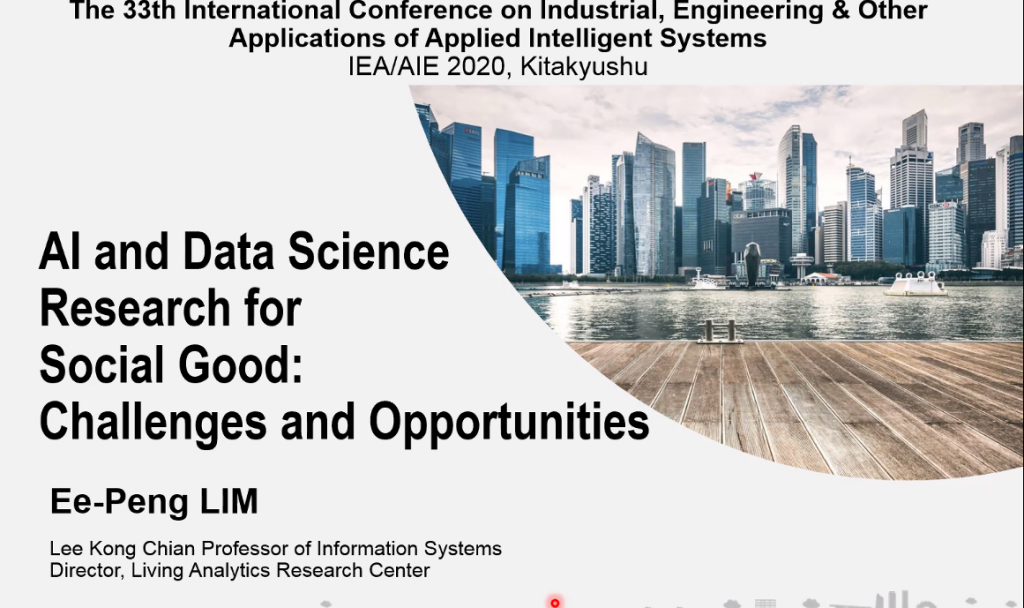
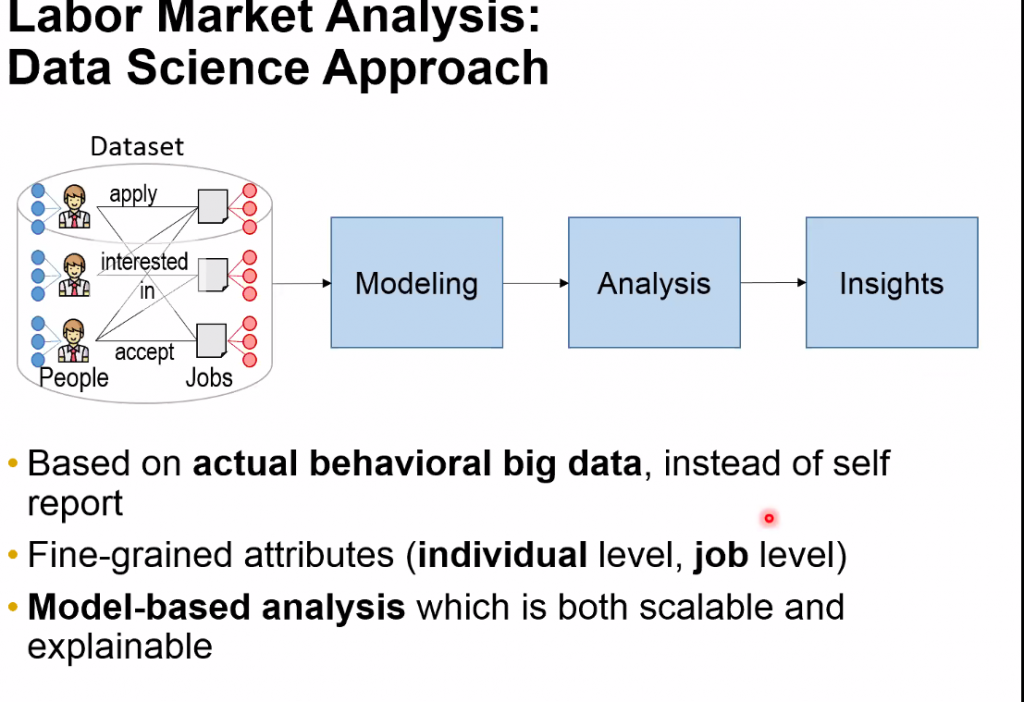
In his conclusion, Prof. Lim also talked about three challenges for the development and adoption of proposed models.



The keynote was followed by several paper presentations on various topics.
Day 2 – regular papers + keynote talks
On the second day, there was more paper presentations and also two keynote talks (one by Prof. Bo Huang and one by Prof. Enrique Herrera Viedma).
The keynote of Prof. Enrique Herrera Viedma was about group decision making, that is how a group of expert can reach an agreement to take decisions.
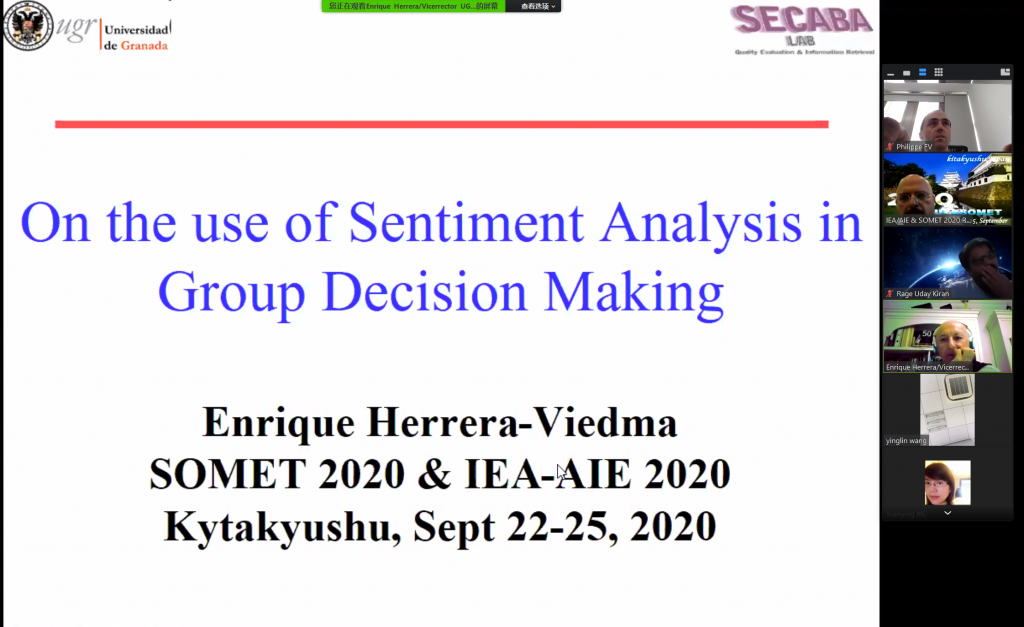
Generally, group decision making is reached through a concensus reaching process which requires discussion between experts and involve multi stage negotiation. Here are a few slides, describing the main process:


He explained that nowadays group decision making is done in a new context, with social networks and Web 2.0 tools.

Then, he discussed in more details about properties of social networks and how sentiment analysis can play a role in decision-making models. Here are a few of the important properties of social networks:

Sentiment analysis can be used in group decision making to understand how a user feels about a particular topic, and in particular the preferences of experts about different alternatives. Here are some details:

Here is an overview of the proposed group decision making based framework

Then, there was more details but I will not report on everything.
An upcoming special issue in the Applied Intelligence journal
Another great thing this year at IEA AIE is that there will be a special issue in the Applied Intelligence journal (Springer, Q2). The best papers of the conference will be invited for an extension in the special issue. Details will be announced after the conference.

Next year… IEA AIE 2021… in Kuala Lampur
It was announced that the IEA AIE 2021 conference will be held next year in Kuala Lampur (Malaysia).
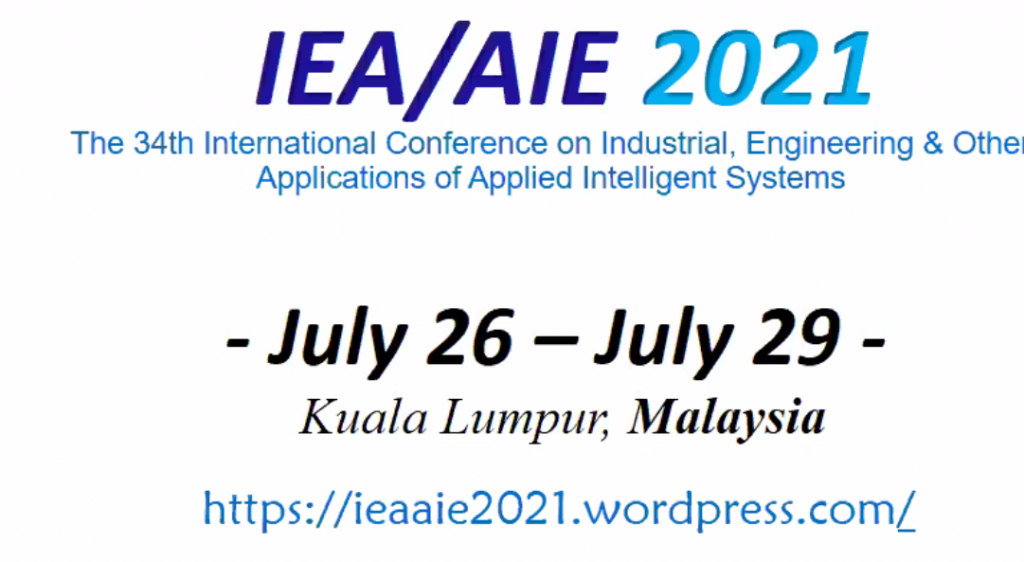
The website of IEA AIE 2021 is already online at http://ieaaie2021.wordpress.com/ Here are the key dates related to this conference:
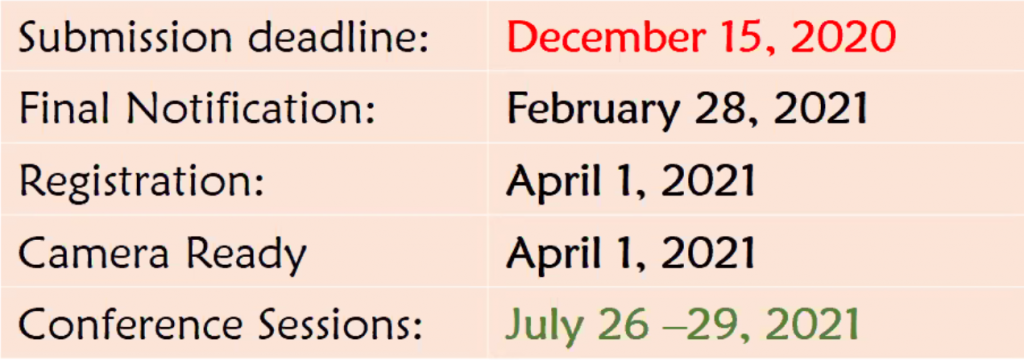
Day 3 and 4 – More paper presentations
On the third and fourth days, there was more paper presentations.
Pattern mining papers
This year, there was 7 pattern mining papers, which shows that it is a popular topic at this conference. These papers cover topics such as periodic itemset mining, and high utility itemset mining. Since this is a topic of interest for me and to several readers of this blog, here is the list of papers:
- TKU-CE: Cross-Entropy Method for Mining Top-K High Utility Itemsets
Wei Song, Lu Liu and Chaomin Huang - Mining Cross-Level High Utility Itemsets
Philippe Fournier-Viger, Ying Wang, Jerry Chun-Wei Lin, Jose Maria Luna and Sebastian Ventura [ppt] - Maintenance of Prelarge High Average-Utility Patterns in Incremental Databases
Jimmy Ming-Tai Wu, Qian Teng, Jerry Chun-Wei Lin, Philippe Fournier-Viger and Chien-Fu Cheng - Efficient Mining of Pareto-front High Expected Utility Patterns
Usman Ahmed, Jerry Chun-Wei Lin, Jimmy Ming-Tai Wu, Youcef Djenouri, Gautam Srivastava and Suresh Kumar Mukhiya - TKE: Mining Top-K Frequent Episodes
Philippe Fournier-Viger, Yanjun Yang, Peng Yang, Jerry Chun-Wei Lin and Unil Yun - Parallel Mining of Partial Periodic Itemsets in Big Data [ppt]
C. Saideep, R. Uday Kiran, Koji Zettsu, Cheng-Wei Wu, P. Krishna Reddy, Masashi Toyoda and Masaru Kitsuregawa - A Fast Algorithm for Mining Closed Inter-Transaction Patterns
Thanh-Ngo Nguyen, Loan T.T. Nguyen, Bay Vo and Ngoc-Thanh Nguyen
Conclusion
I have enjoyed the conference. Next year, IEA AIE 2021 will be in Malaysia, and then IEA AIE 2022 in Japan.
—
Philippe Fournier-Viger is a computer science professor and founder of the SPMF open-source data mining library, which offers more than 170 algorithms for analyzing data, implemented in Java.





Pingback: Brief report about the IEA AIE 2021 conference | The Data Mining Blog
Pingback: Real Conferences VS Virtual Conferences | The Data Mining Blog
Pingback: Brief report about the IEA AIE 2022 conference | The Data Mining Blog
Pingback: A brief report about the IEA AIE 2019 conference | The Data Mining Blog